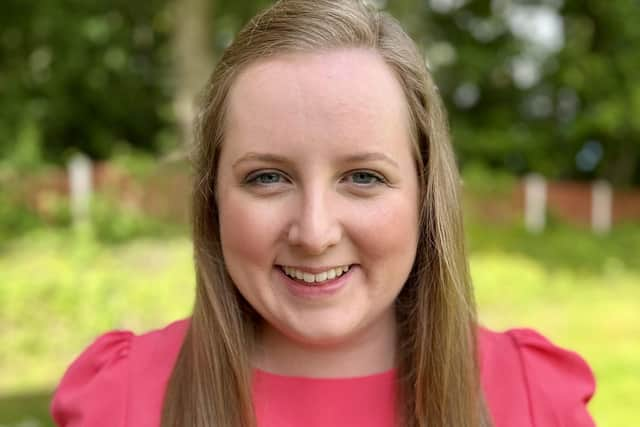Chesterfield accountant named one of UK’s most influential disabled people – after devoting herself to tackling workplace stigma
and live on Freeview channel 276
Natalie Hiller is a chartered accountant working within PwC’s deals team, and has lived in Chesterfield all of her life – attending New Whittington Infant School, Apperknowle Primary and Netherthorpe School.
It was back in 2012 that Natalie had to adapt to living with disabilities – and has spent much of the last decade working to change the perceptions around disabled people in the workplace.
Advertisement
Hide AdAdvertisement
Hide Ad“I first became disabled in 2012, whilst studying at Durham University. My mobility and dexterity disabilities affect my walking and use of my hands. It was a life adjustment in my early twenties but from the start, challenging the stigma around disabilities was something I’ve been very passionate about.


“When I became disabled in 2012, I felt that the world was a lot less inclusive to disabled people than it is today. I try to use what I have learned over the years to help others.
“There can be a misconception that disabled people are not very intelligent or successful. This can negatively impact the career prospects of disabled people who can work. To change these perceptions we need to continue to normalise disabled people working and succeeding in the workplace. I think that being able to see role models is very important.
“To address this, I developed a set of illustrations showing disabled people at work and they have since been incorporated into PwC branding.”
Advertisement
Hide AdAdvertisement
Hide AdNatalie also volunteers as the co-chair of PwC’s national disability awareness network, using her experiences to help those living with disabilities pursue careers in accountancy.
She said: “I focus a lot of my advocacy in my area of work – accountancy. I believe the skills and perspectives of those with disabilities can benefit the profession and I want to help with attracting talented disabled people into this line of work.
“I’ve done this in a variety of ways, such as being a panellist at PwC events and featuring in blogs and articles. These have included the recruitment campaigns of both PwC and the Institute of Chartered Accountants England and Wales (ICAEW).
“I think there is a lot of energy around increasing inclusion in the accountancy profession at the moment. There are so many more events on disability awareness. Technological advancements mean that there is now more assistive technology that people can use at work.
Advertisement
Hide AdAdvertisement
Hide Ad“I think that the industry can continue to challenge the stigma around disability to ensure disabled people have fair opportunities to thrive.”
Natalie’s work has been recognised with her inclusion in the Shaw Trust Disability Power 100 for the second year running. This prestigious award recognises the 100 most influential disabled people in the UK – and Natalie said this has only increased her determination.
“To be recognised for a second year in this list is really special and reinforces my motivation to make the workplace and society more inclusive to disabled people. I hope that together we can create a world where everyone appreciates the value someone can bring over and above their disability.”
Advertisement
Hide AdAdvertisement
Hide AdNatalie’s advice to anyone living with a disability, who may feel anxious about careers and job opportunities, is to remember that their experiences give them a perspective and set of skills that others may lack.
“I believe that disabled people have the potential to achieve just as much, if not more, than everyone else – they just have to do things in a different way. I would encourage disabled people to embrace this attitude whilst considering careers.
“I would also encourage disabled people to request any reasonable adjustments that they need to exams and interviews to ensure that they have fair opportunities to succeed.
“It’s important that people consider whether their disability gives them any additional skills. For instance, I think that having a disability has enhanced my problem solving skills, my ability to think outside the box, and my resilience.
“I believe that having a disability gives you a different perspective on the world and this can be very useful in the workplace.”